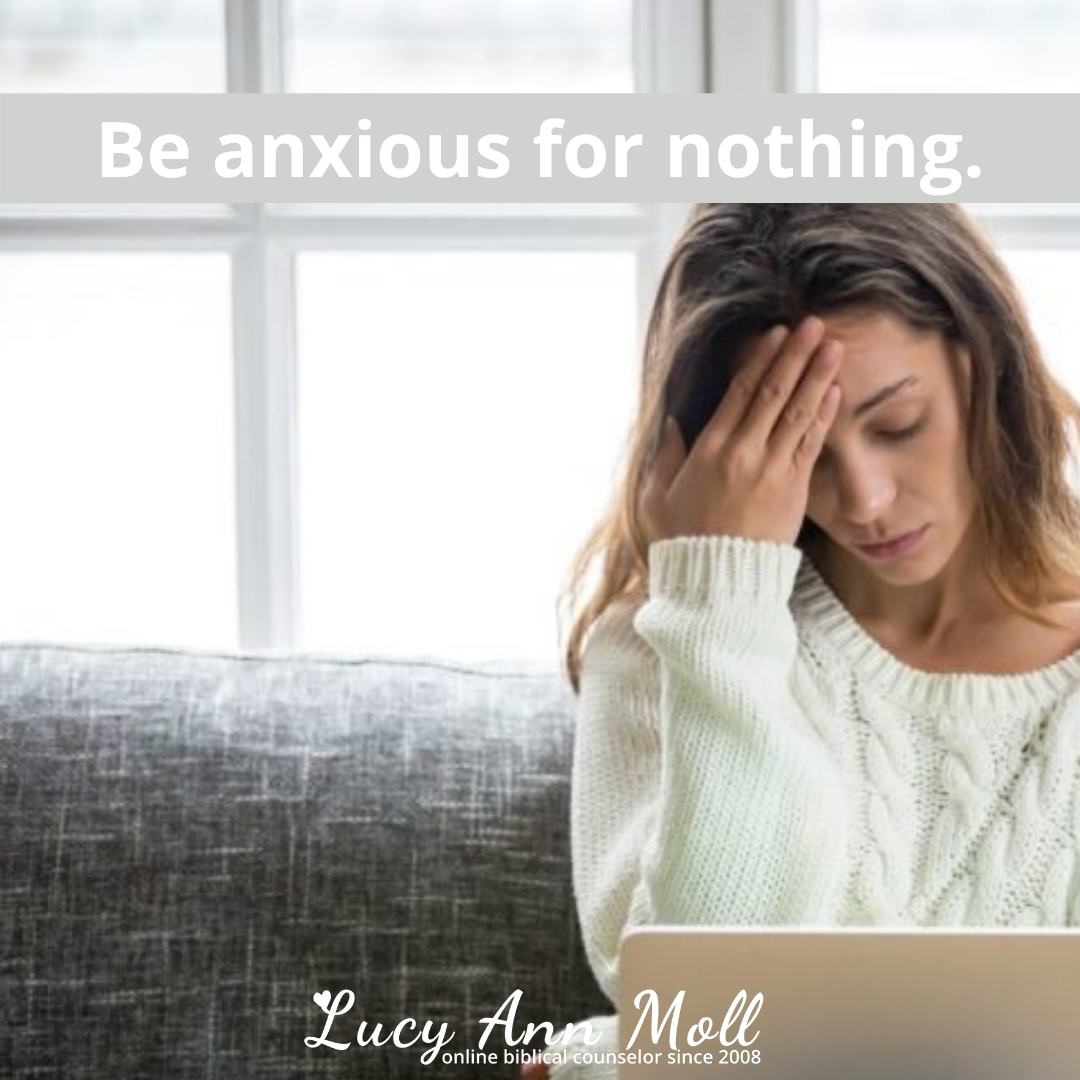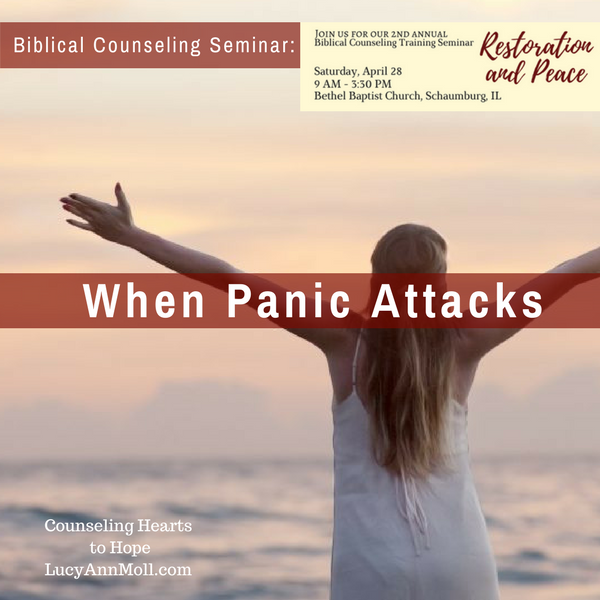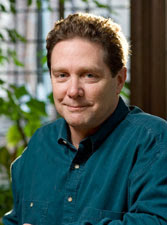
by Lucy | Apr 16, 2021 | biblical counseling, emotions
Is it possible to live anxiety-free and in peace? To be “anxious for nothing,” as the apostle Paul mandated us believers (Phil. 4:6, NKJV)?
In his book Anxiety: Knowing God’s Peace (P&R Publishing, 2019), Paul Tautges defines anxiety as a distracting care – “to have our minds and our hearts in two worlds.” This distracting care diverts our attention from the eternal Lord to temporal, earthly concerns. Anxiety not only divides our minds, but also weighs us down.
This article appeared first here on the Biblical Counseling Center (BCC) website. I’ve counseled through BCC since 2014 (now exclusively through Telehealth online video), and I specialize in helping women and families overcome fear, worry, and panic.

We can also describe anxiety as the emotion of uncertainty. Sometimes, it reveals itself as a conglomeration of nagging worries. Nothing horrible or deadly, more like a swarm of mosquitoes than an agitated rattlesnake.
At other times, anxiety is a debilitating panic. It can feel like a knife stabbing you in the chest with every breath, or like a lump in the throat, or sweaty palms, or wobbly Jell-O knees, or any number of uncomfortable, unwanted body sensations experienced when we’re highly stressed. It can also show itself as fear of man or any number of other expressions of anxiety.
Whether nagging worries, or debilitating panic, or any other expression of it, anxiety has powerful and negative effects on the body. We’ve all experienced it personally.
Peace through understanding anxiety’s effects
A pressure is first evaluated in the mind. “Do I have enough money in the bank to cover the $200 water bill?” If we check our account and it has several thousands in it, we relax. But if there is only a measly $20, our pulse may quicken and our thoughts may scurry like mice, looking for an answer to our financial conundrum.
 When anxiety persists (and often it does in today’s chaotic times), it can have negative effects on the body: muscular tension, headaches, gastro-intestinal problems, and so forth. When left unresolved, anxiety may lead to depression and other negative emotions as well as phobias, panic attacks, and compulsive behaviors. (Since some of these problems may have an organic, physical cause, it is always wise to consult a health practitioner.)
When anxiety persists (and often it does in today’s chaotic times), it can have negative effects on the body: muscular tension, headaches, gastro-intestinal problems, and so forth. When left unresolved, anxiety may lead to depression and other negative emotions as well as phobias, panic attacks, and compulsive behaviors. (Since some of these problems may have an organic, physical cause, it is always wise to consult a health practitioner.)
When I’m mildly anxious, my upper shoulder muscles often become tight and a tension headache may ensue. If I ruminate on whatever is bothering me into the evening, insomnia is my probable bed companion. Sometimes I stress-eat chocolate.
If my anxiety goes way beyond nagging worries and has catapulted into panic, a horribly frightful and often recurring experience I’ve described in Help: I Get Panic Attacks(Shepherd Press, 2019) and in this blog article, “The Truth of a Panic Attack,” then my bodily sensations may include a racing heart, perspiration, numbness of fingers and toes, feeling faint, and a sense of doom.
With anxiety, we’ve each lived it, hated it, and wished it gone, yet it hangs like chains around our hearts.
In Psalm 31, David describes the interconnectedness of the body and the mind, and he nails the solution; that is, turning to God: “But as for me, I trust in You, Lord, I say, ‘You are my God.’” I encourage you to invest a few minutes in reading it and meditating on its truths.
Peace through the renewing of the mind
A mind renewed by the truth of God as revealed in Scripture is the only lasting antidote for anxiety and other negative emotions. Tautges counsels, “Ultimately, security and peace come from the Lord—from knowing and trusting the character and love of God. So don’t let your anxiety lead you away from God. Run to Him today.”
Indeed, a right view of God will replace anxiety with peace.
Lisa came to counseling for anxiety. As I heard her story, I learned that she had been an excellent student and a rule follower. It was important to her to please her parents and her teachers. Now married, she desired to please her husband too. When she received his approval (or at least not his disapproval), she felt good. When she feared that he wasn’t pleased, her anxiety ruined her day. She became extremely introspective and also irritable, trying to figure out how to get her husband’s favor.
As you probably gathered, the root problem of her anxiety was the fear of man, specifically her husband. She wasn’t afraid of him in the sense that she thought he might hit her. Rather, she feared his disapproval.
Proverbs 29:25 says, “The fear of man lays a snare, but whoever trusts in the LORD is safe.”
In counseling, she learned to be resolute in doing what was right in the eyes of God, not in the opinion of her husband. This also required some uncomfortable conversations with her husband. Ephesians 4:15 calls us to speak the truth in love. As Scripture renewed her mind, she determined to take a leap of obedience and to trust and obey God. She took to heart 2 Timothy 1:7— “For God has not given us a spirit of fear, but of power and love and discipline.”
Peace through an actionable plan to overcome anxiety
The Bible urges us to renew our minds (Rom. 12:2, Eph. 4:23). But how does this happen, this renewing of the mind? This is a common question among anxiety-plagued Christians who are seeking a biblical solution. Let us consider these four parts.
First, right belief.
Overcoming anxiety begins with the right belief about the goodness and greatness of God, and our relation to Him. He is the Creator, we are the created. He is the Potter, we are the clay. Consider studying the attributes of God. A good study Bible would be helpful in this endeavor, so are books on this topic by A.W. Tozer, Arthur W. Pink, and (more recently) Jen Wilkins.
Second, right thoughts and desires.
What we believe is the foundation for our thinking. “As a man thinks, so he is” (Prov. 23:7). Our thoughts are a reflection of who we really are.
Third, do right.
Our actions flow from our beliefs and our thoughts. Even though it is difficult, we must not let our emotions rule us. God calls us to live by faith, not our feelings.
Fourth, feel right.
When we “do right,” that is to trust and obey God as His beloved children whom His Spirit guides and empowers, we will feel right. We have the peace that comes from a renewed mind.
Example: When the shepherd boy David brought lunch to his older brothers who were part of the Israelite army cowering in fear (1 Sam. 17), he took stock of the scene. He viewed the giant Goliath as a tiny, annoying gnat in comparison to the almighty God whom he served. In the presence of all gathered, he declared to Goliath, “You come to me with a sword, a spear, and a saber, but I come to you in the name of the Lord of armies, the God of the armies of Israel, whom you have defied. This day the Lord will hand you over to me. (17:45-46a, NASB).
We all know the rest of this story. David killed that giant with a sling and a stone, and the victory belonged to God.
David displayed right belief > right thinking/desire > right action > right feeling. How can you and I do the same? Recall Paul’s admonition in Phil. 4:9: “As for the things you have learned and received and heard and seen in me, practice these things, and the God of peace will be with you.”
Closing reflection
I hope this description of anxiety and God’s solution to it have given you more insight into how to respond biblically when nagging worries, debilitating panic, the fear of man, or another expression of fear assails you or a loved one.
We can gain more empathy for those who have anxiety. We can remember that God gives us His solution for overcoming it and finding peace. What is a practical and Godward action step that you can take today?

by Lucy | Aug 29, 2020 | emotions
When fear gets the upper hand, and we struggle to know what to do, it may help to have a plan in place. This method helps to calm your anxious feelings that flow from your thoughts. Does it “work” every time you’re afraid? No, of course not. Will is help you understand your emotion and learn how to respond to it wisely? Yes!
MAIN POINT: We can learn to conquer fear as we trust God and apply his truth to our minds.
This article appeared first here at Biblical Counseling Center, where I am on staff providing counseling by video to people all over the world.
Where fear flourishes, there your heart will be also.1
From a mild sense of unease to full-blown panic, fear is an emotion most of us would rather live without. It communicates that someone or something we care about is being threatened or that we might lose it. Fear shows us what we value most.
Consider these three folks who are afraid.
In each case, try to figure out what they each value most.
- Dolores’s elderly mother has dementia and is in the memory care unit of a health facility, which so far has kept its patients and workers safe from COVID-19. Nonetheless, she loses sleep worrying night after night, fearing for her mother’s well-being.
- Breanna has packed her high school schedule with advanced placement and dual-credit classes, hoping to gain admission to a high-ranking university. She fears her friends might make fun of her if she attends a community college.
- John just learned that his company is hiring new workers in his department and is wondering if he’ll be laid off. If he lost his job, how would he make rent and pay utilities?
Fear is very real, and it can keep us from functioning in our daily lives. So how can we calm our fears?
1. Identify your emotion as fear.
Sometimes, identifying an emotion is not as easy as it sounds. You may feel uneasy or nervous or freaked out; you may also feel overwhelmed or hurt. Is fear the most accurate descriptor?
If you’re not sure, ask yourself if you feel like pulling away from people or clinging to them. This reaction is a hallmark of fear: it prods us to seek safety, security, and certainty.
EXAMPLES: A teen who’s afraid of getting judged by friends at church may decide to skip the in-person service and watch the live stream instead; A guy who fears that his girlfriend is going to dump him may respond by showering her with gifts and sending her one text after another.
2. Examine your fear like a scientist.
Once you’ve identified your emotion as fear, examine what is going on by asking yourself a host of questions (you may discover it helps to write down your answers):
Is there a place connected to the fear? Perhaps it is linked to your workplace or to a room in your home, or a place in your town. For the longest time, after I was attacked by a dog at age 8, I could not walk down Bellforte Avenue, near where it happened. Just going near that street caused my heart to pound like a drum.
Is there a certain time that unnerves you? Some of us don’t like a certain holiday or the anniversary of a family member’s death date because it brings uneasy memories of painful events.
Is there a type of activity or a particular person linked to the fear you feel? One of the people I counseled told me she becomes greatly alarmed when she hears sirens. She connects the sound of them to the untimely death of her baby.
3. Evaluate your fear.
Begin by considering your reaction. Ask yourself, is my reaction godly and constructive, or is it sinful and destructive? An example of constructive concern is studying for an algebra exam. You want a good grade so you memorize formulas and rework problems until you are confident you know the material.
In a similar way, David in the Old Testament had a constructive reaction when he faced Goliath (1 Sam. 17). He chose the best weapon for him to defeat the giant (a sling and five smooth stones), and he came in the name of the Lord Almighty, the God of Israel, who had promised victory over the Philistines. His courageous reaction to Goliath sharply contrasted the reaction of the army of Israel, who cowered in fear.
Biblical truth gives us reason to hope and teaches us to turn to God. “No matter what the danger or what we are valuing, God can be trusted with our treasures, and every fear ought to drive us straight toward the Lord in prayer, obedience, and fellowship!” [2]
Next, ask yourself how likely it is that what you fear will actually happen? Let’s say you fear that a routine medical exam might suggest the presence of cancer. Consider the likeliness of a bad result; while possible, it is very low, and worrying about it would be a waste of your energy (Matt. 6:34).
Finally, ask yourself, what is the worst that could happen? When my relatively new refrigerator needed repair for the third time three months in a row, I asked myself this exact question and realized that the worst was the hassle of another repair or getting another fridge, which was under warranty (thankfully). My evaluation gave me a sense of relief, not dread.
4. Act wisely in response to your emotion.
When you identify, examine, and evaluate your fear, you may come to a realization that it was not a big deal after all.
Conversely, you may detect a troubling pattern. For instance, you may notice you have a tendency to worry, to look to people for their approval, to avoid certain situations (e.g., riding an elevator) for fear of a panic attack, and so on.
In any case, it is wise to act in response to fear in godly ways. Here are a few of them:
Train yourself to turn to Scripture. A few excellent passages to read regularly are Phil. 4:4-9, Matt. 6:25-34, Luke 12:22-34, Psalm 23, and Psalm 27.
Practice deep breathing and other healthy habits. Inhaling and exhaling slowly helps us to relax. Other healthy habits are giving yourself ample time to get from place to place, unplugging from the internet, and steering clear of computer screens late in the day, which may interrupt sleep. Additionally, you might incorporate or begin regular exercise (as always, check with your doctor), good nutrition, and a bedtime routine. You’ve already heard healthy tips; decide which one you’ll begin to make a habit.
Face your fears wisely. Are you afraid to ask your boss for a raise? Are you avoiding a family member who unnerves you? Does the idea of flying in an airplane cause your heart to skip a beat? To face your fears wisely, be sure to examine and evaluate them, and have a thought-out plan. Discuss your plan with a trusted Christian friend and loved ones who can support you. You may also consider talking with a biblical counselor.
Hope for a Peace-Filled Life
What you fear need not rule your life. A method to calm your fears helps you to understand that fear reveals your treasure and provides a plan to identify, examine, and evaluate it and to respond to it wisely in accordance with Scripture.
When you handle this negative emotion in the right way, your trust in God increases, and others will begin to ask you the secret that the Apostle Paul had come to know.
“The things you have learned and received and heard and seen in me, practice these things, and the God of peace will be with you” (Phil. 4:9).
[1] This quote comes from the excellent book Untangling Emotions by J. Alasdair Groves and Winston T. Smith (Wheaton, IL: Crossway), 2019, 153. It is a play on Matthew 6:21, which reads, “where your treasure is, there your heart will be also.” The book presents an identify-examine-evaluate-act approach to engaging every emotion. I highly recommend it to those who provide and receive counseling.
[2] Ibid., 160.

by Lucy | Apr 23, 2018 | biblical counseling, Counselor Resources
SEMINAR: I am super happy to speak on the intense fear experience our culture terms “panic attacks” at the 2nd Annual Biblical Counseling Training Conference on Saturday, April 28. If you’re in the Chicago area, why don’t you join me?
One reason I’m excited to share my seminar at the conference is my personal experience as a former panic attack sufferer. Please note: former! And another reason is my experience counseling of women and children plagued with anxiety, worry, and fear. To overcome panic, I had tried all of the usual solutions — even tapping on pressure points on my hand. (That was a weird experience.) Then I turned to biblical solutions. Renewing my mind with God’s transformational truth led me away from me and to Jesus.
My seminar is part of BCC’s biblical counseling training conference just outside Chicago. I invite you to come. It begins at 9 a.m. but come a lttle early to check in. The beautiful venue is Bethel Baptist Church, 200 N. Roselle Road, Schaumburg, IL Also you can register on Saturday but it’s a little costlier. Online registration: $30. Walk-in registration: $40.
The Schedule
Morning Keynote: Restoration That Works, Dr. Nathan Millican
“Restoring Conversations” are workshops that helps us live out the call to be instruments of restoration and peace in one another’s lives. How does this look in real life conversations? These workshops will help you understand how to bring biblical wisdom and practical truth together in restorative ways.
Morning Workshop 1: 10:15 to 11AM
- Biblical Counseling Basics 1, Dr. Ron Allchin
- Helping Adoptive Parents, Sherry Allchin
- Engaging Mental Illness, Brandon Lowery
- When Panic Attacks, Lucy Ann Moll
- Relating with Difficult People, Carol Wright
Morning Workshop 2: 11:15 to Noon
- Biblical Counseling Basics 2, Dr. Ron Allchin
- Using a Life Story Tool, Dr. Donna Hart
- After Infidelity, Brandon Lowery
- When Panic Attacks, Lucy Ann Moll
- Relating with Difficult People, Carol Wright
Optional Seminar for Pastors/Elders
10:15-12:15 Step by Step Guide to Starting a Counseling Ministry – Dr. Tim Allchin
Afternoon Keynote: Relational Peacemaking, Dr. Tim Allchin
Peacemaking Tracks are designed to take biblical peacemaking principles and learn how to apply them to specific relationship contexts. Each workshop will have tools, handouts and interaction about peacemaking strategies.
Afternoon – Workshops 2:00—3:30
- Tools for Difficult Marriages, Dr. Ron Allchin and Sherry Allchin
- Peacemaking in Church Conflict: Dr. Tim Allchin
- Your Heart in Personal Conflict, Dr. Donna Hart
- Peacemaking in Parenting: Brandon Lowery
If you have questions or want a complimentary consult, feel free to contact me. I also hope to see you at my seminar!
Counseling Hearts to Hope.

by Lucy | Oct 17, 2017 | biblical counseling, book reviews, emotions, identity in Christ
 Peace is a hot commodity today. We all want it in our anger-infused, Twitter-bombed world. But how?
Peace is a hot commodity today. We all want it in our anger-infused, Twitter-bombed world. But how?Biblical counselor and psychologist
Ed Welch offers hope for change for people who struggle with irritation and want peace. Really, who likes anger? And as
Welch sound-bites: To be angry is to destroy. Big Problem
Yes, anger pours out testy words.
Eye rolls and sighs reveal the simmer. Slammed doors shake homes and relationships. Anger may whisper or shout, but is almost always destructive. And Jesus had much to say about anger and its antitode:
God-honoring peace.Welch fills the pages with scripture passages and with instruction to overcome anger. His target:
the heart. His method: letting you see the yuck of anger and inviting you to want treasure in heaven most of all. It’s a self-versus-God attitude and choice, isn’t it?.
Hello, Peace!
On the path to peace, you’ll meet afresh the Prince of Peace: Jesus. You’ll also discover your need
to forgive. And pray. And bless an enemy. Welch suggests you read the meditations a day at a time. This way your mind and heart absorb all that is anger and hate it. You also learn to love peace and seek the Peace-Giver.
So if you’re sick of anger and want peace, read this little-big book–all 50 days.
Meet the Author

Edward T. Welch, M.Div., Ph.D., is a licensed psychologist and faculty member at the Christian Counseling & Educational Foundation (CCEF). He earned a Ph.D. in counseling (neuropsychology) from the University of Utah and has a Master of Divinity degree from Biblical Theological Seminary. Ed has been counseling for over thirty years and has written extensively on the topics of depression, fear, and addictions.
by Lucy | Oct 12, 2017 | biblical counseling, emotions, emotions |
 Is regret messing with your peace? Is it so painful that you’d like to erase a part of your past? Let’s look at regret — what it is, the two main types, and how to move toward restoration.
Is regret messing with your peace? Is it so painful that you’d like to erase a part of your past? Let’s look at regret — what it is, the two main types, and how to move toward restoration.
Regret Defined
Regret is feeling sorrow or remorse for something you did or failed to do. Sometimes it turns into disappointment. This feeling of regret can be turned toward God as you seek him in your pain. Or it can become discontentment, even despair.
Discontentment is an ugly response to regret. It describes a person’s dissatisfaction with what God is doing in his life at the moment. She may have self-pity and see herself as the undeserving victim of unfair circumstances.
Regret Due to Human Error
Regret may result from an honest though awful mistake. Dr. Erwin Lutzer shared the story of a missionary airplane mechanic with an excellent service track record. One day while tightening a bolt, he was called away before he finished. He forgot to return and complete the bolt tightening.
The consequence of this one mistake proved disastrous. The plane took off. Gasoline leaked from the place where the bolt was loose. The plane caught on fire and all seven people on the plane died. Without a doubt, this mechanic wished he could erase the past. He feels deep regret.
Regret Caused on Purpose
This type of regret results when you choose a certain path that you know is wrong. The Holy Spirit impresses on your heart the your ugly choice rubs against God’s will but you continue on.
Think Peter the apostle.
He denied knowing Jesus Christ three times, then the rooster crows. Peter weeps tears of regret and emotional pain.
And immediately the rooster crowed a second time. And Peter remembered how Jesus had said to him, “Before the rooster crows twice, you will deny me three times.” And he broke down and wept. Mark 14:72, ESV
2 Steps to Restoration
1. Bring it into the open.
Pushing down the past smothers you. Did you know that the more you try not to think about the regret, the more focus you direct toward it?
God’s plan for moving forward requires facing the past and acknowledging the sin, the pain, and the fallout.
2. Move forward.
To move forward means forgiving, repeatedly if necessary, letting God deal with those who have sinned against you, and continuing to respond in a godly way regardless of how they behaved.
Beloved, never avenge yourselves, but leave it to the wrath of God, for it is written, “Vengeance is mine, I will repay, says the Lord.” Romans 12:19, ESV
When you choose God’s solutions, an upward and forward movement begins! It’s time, don’t you think, for a fresh start? Christ and His Word will move you in the right direction if you let Him!
Through the Lord’s mercies we are not consumed, because His compassions fail not. They are new every morning; Great is Your faithfulness. “The Lord is my portion,” says my soul, “Therefore I hope in Him!” Lamentations 3:22-24, ESV

Do you need help finding peace? I’d love to help you!
Sharing hope with your heart, I’ll provide you with solution-focused biblical counseling. Contact me today and we can set up an appointment in person or by Skype. (I’ve counseled women, couples, and families in five continents.) Check out more about me here.
Counseling Hearts to Hope,



 When anxiety persists (and often it does in today’s chaotic times), it can have negative effects on the body: muscular tension, headaches, gastro-intestinal problems, and so forth. When left unresolved, anxiety may lead to depression and other negative emotions as well as phobias, panic attacks, and compulsive behaviors. (Since some of these problems may have an organic, physical cause, it is always wise to consult a health practitioner.)
When anxiety persists (and often it does in today’s chaotic times), it can have negative effects on the body: muscular tension, headaches, gastro-intestinal problems, and so forth. When left unresolved, anxiety may lead to depression and other negative emotions as well as phobias, panic attacks, and compulsive behaviors. (Since some of these problems may have an organic, physical cause, it is always wise to consult a health practitioner.)



 Peace is a hot commodity today. We all want it in our anger-infused, Twitter-bombed world. But how?
Peace is a hot commodity today. We all want it in our anger-infused, Twitter-bombed world. But how? Edward T. Welch, M.Div., Ph.D., is a licensed psychologist and faculty member at the Christian Counseling & Educational Foundation (CCEF). He earned a Ph.D. in counseling (neuropsychology) from the University of Utah and has a Master of Divinity degree from Biblical Theological Seminary. Ed has been counseling for over thirty years and has written extensively on the topics of depression, fear, and addictions.
Edward T. Welch, M.Div., Ph.D., is a licensed psychologist and faculty member at the Christian Counseling & Educational Foundation (CCEF). He earned a Ph.D. in counseling (neuropsychology) from the University of Utah and has a Master of Divinity degree from Biblical Theological Seminary. Ed has been counseling for over thirty years and has written extensively on the topics of depression, fear, and addictions. Is regret messing with your peace?
Is regret messing with your peace?

